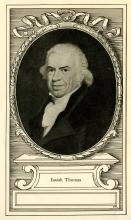The Marriage of Isaiah Thomas and Mary Dill
 Isaiah Thomas (shown at right as a prosperous old man, courtesy of Amherst College) was apprenticed to the printer Zechariah Fowle on 4 June 1756, at the age of seven. Although his mother was still alive, Boston’s Overseers of the Poor arranged this indenture for Isaiah as “a poor boy belonging to said Boston.”
Isaiah Thomas (shown at right as a prosperous old man, courtesy of Amherst College) was apprenticed to the printer Zechariah Fowle on 4 June 1756, at the age of seven. Although his mother was still alive, Boston’s Overseers of the Poor arranged this indenture for Isaiah as “a poor boy belonging to said Boston.”
Isaiah was supposed to work for Fowle until he turned twenty-one on 8 Jan 1769. However, he released himself on his own recognizance in September 1765, sailing off to the excitement of Nova Scotia. In Halifax, Isaiah worked for a Dutch-born printer named Anthony Henry. After a couple of years, the young man tried working on his own in the Carolina colonies.
While there, Thomas married a woman from Bermuda named Mary Dill on 25 Dec 1769. She had a stillborn child sometime in the following year, so it’s possible they had to get married. Later Thomas wrote that “soon after his Marriage to his Astonishment he found that his Wife had had a bastard some Years before & that she had been prostituted to the purposes of more than One.”
The couple sailed to Boston, perhaps for a new start. In late 1770 Isaiah renewed his acquaintance with Zechariah Fowle and convinced him to become a partner in printing a new newspaper, the Massachusetts Spy. After a tough start—the men found they couldn’t make money selling three issues a week, as originally planned—the Spy established itself as Boston’s second radical Whig paper.
In 1772, however, Mary Thomas expressed “a great desire of Living in her native country (Bermuda).” Isaiah wrote to some officials or wealthy merchants on that island asking if they would support a new newspaper there. He even made an implicit offer to tone down his politics, explaining in an 18 March letter that “one of my profession here must be either of one party or the other, (he cannot please both).” Fowle heard through Dr. Thomas Young that Thomas might be planning to leave, and insisted on dissolving their partnership immediately.
No openings in Bermuda seem to have presented themselves, and Thomas’s Massachusetts Spy was pulled further into the resistance movement. Gov. Thomas Hutchinson even tried to prosecute the printer and some of his political essayists, but the Suffolk County grand jury refused to hand down an indictment.
By early 1775, Mary and Isaiah Thomas had had three children together, but the couple was drifting apart. Mary was, according to Isaiah, showing a “petulance of Temper & unhappiness of Disposition which she daily exercised to the disturbance of domestic Peace.” And of course they were still in Boston.
TOMORROW: Can this marriage be saved?

3 comments:
I'm going to guess no. But yes would make a better story so I should probably be guessing yes.
I suppose it's a sadly common story with a surprise guest star.
I would say definetly not...
Post a Comment